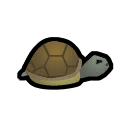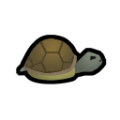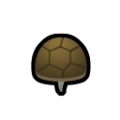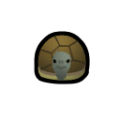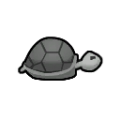Difference between revisions of "Tortoise"
Theaetetus (talk | contribs) (+ armor ratings) |
|||
| (83 intermediate revisions by 26 users not shown) | |||
| Line 1: | Line 1: | ||
| − | + | {{infobox main|animal| | |
| − | + | | page verified for version = A14D | |
| − | + | | name = Tortoise | |
| − | |name = Tortoise | + | | image = Tortoise.png |
| − | |image = Tortoise.png | + | | description = This heavily armored land-dwelling reptile is known for its slow moving speed and surprisingly vicious bite. Because of its natural armor, it is tough to kill and can do serious damage during drawn-out melee fights. |
| − | |description = | + | | type = Animal |
| − | |type = | + | | movespeed = 1 |
| − | | | + | | armorblunt = 35 |
| − | |bodysize = 0.5 | + | | armorsharp = 50 |
| − | |healthscale = 0.6 | + | | min comfortable temperature = 0 |
| − | |hungerrate = 0. | + | | max comfortable temperature = 50 |
| − | |diet = omnivorous | + | | flammability = 0.7 |
| − | | | + | | marketvalue = 200 |
| − | | | + | | eggsmin = 1 |
| − | | | + | | eggsmax = 3 |
| − | | | + | | eggs_avg = 2 |
| − | | | + | | eggtime = 6.66 |
| − | | | + | | eggs_unfertilized = false |
| − | | | + | | combatPower = 70 |
| − | | | + | | bodysize = 0.5 |
| − | | | + | | healthscale = 0.6 |
| − | | | + | | hungerrate = 0.0825 |
| − | | | + | | diet = omnivorous grazer |
| − | | | + | | leathername = lizardskin |
| − | | | + | | wildness = 0.75 |
| − | | | + | | manhuntertame = 0 |
| − | | | + | | manhunter = 0 |
| − | | | + | | trainable = none |
| − | | | + | | mateMtb = 12 |
| − | | | + | | lifespan = 180 |
| − | | | + | | juvenileage = 0.15 |
| − | | | + | | maturityage = 0.2222 |
| − | | | + | | tradeTags = AnimalUncommon |
| − | | | + | | attack1dmg = 8 |
| − | | | + | | attack1type = Bite |
| − | + | | attack1cool = 2.6 | |
| − | | | + | | attack1part = beak |
| − | }} | + | | attack2dmg = 3 |
| + | | attack2type = Blunt | ||
| + | | attack2cool = 2.6 | ||
| + | | attack2part = head | ||
| + | | attack2chancefactor = 0.2 | ||
| + | | livesin_temperateforest = 0.3 | ||
| + | | livesin_temperateswamp = 0.6 | ||
| + | | livesin_tropicalrainforest = 0.5 | ||
| + | | livesin_tropicalswamp = 0.5 | ||
| + | }} | ||
| + | {{info|'''Tortoises''' are crawling omnivores which live in the moderate climates of the [[temperate forest]] and [[temperate swamp]], and the sweltering humidity of the [[tropical rainforest]] and [[tropical swamp]].}} | ||
| − | + | == Analysis == | |
| + | Tortoises are the single best animal for meat : nutrition input, or ''nutrition efficiency''. This is due to their remarkably low hunger rate. A tortoise farm can also produce a lot of leather. However, tortoises are not [[pen animal]]s. They must be re-tamed every {{#expr:12 - 6*{{P|Wildness}} round 2}} days, or carefully slaughtered just before they become un-tame, which requires a lot of micromanagement. Players may prefer to ranch animals like the [[ibex]] and [[horse]], as they do not require nearly as much work to farm. | ||
| − | {{ | + | ===Nutrition=== |
| + | When slaughtered, a tortoise yields {{#vardefineecho:baby_meat|{{Meat Leather Curve|{{#expr:{{P|Body Size}}*0.2*140}}}}}} meat and {{Meat Leather Curve|{{#expr:{{P|Body Size}}*0.2*40}}}} [[lizardskin]] as a baby; {{Meat Leather Curve|{{#expr:{{P|Body Size}}*0.5*140}}}} meat and {{Meat Leather Curve|{{#expr:{{P|Body Size}}*0.5*40}}}} lizardskin as a juvenile; or {{Meat Leather Curve|{{#expr:{{P|Body Size}}*140}}}} meat and {{Meat Leather Curve|{{#expr:{{P|Body Size}}*40}}}} lizardskin as an adult. 1 meat is worth 0.05 nutrition. A tortoise's [[Tortoise egg (fert.)|fertilized egg]] only provides {{Q|Tortoise egg (fert.)|Nutrition}} nutrition, compared to the {{#expr:{{#var:baby_meat}}*0.05}} of a butchered baby. Therefore, a tortoise should always be allowed to hatch. | ||
| − | + | An adult tortoise consumes {{P|Real Hunger Rate}} nutrition per day, and a fertilized female creates an average of {{#expr: {{P|Eggs Per Clutch Average}}/{{P|Egg Laying Interval}} round 2}} offspring per day. | |
| − | + | * When offspring are slaughtered as babies, a female tortoise will produce {{#expr:{{Meat Production|{{PAGENAME}}|baby}} round 2}} nutrition of meat per day, giving a potential nutrition efficiency of {{%|{{Meat Production|{{PAGENAME}}|baby}}/{{P|Real Hunger Rate}} round 3}}. | |
| + | * If the offspring are allowed to grow to adulthood, they will consume an additional {{#expr:{{Nutrition Consumption|{{PAGENAME}}|adult}} - {{P|Real Hunger Rate}} round 2}} nutrition per day, but will instead yield {{#expr:{{Meat Production|{{PAGENAME}}|adult}} round 2}} nutrition per day as they are slaughtered, resulting in a potential nutrition efficiency of {{%|{{Meat Production|{{PAGENAME}}|adult}}/{{Nutrition Consumption|{{PAGENAME}}|adult}} round 3}}. | ||
| + | This does not consider the food required of male tortoises. A female:male ratio of {{#vardefineecho:femaleratio|{{#expr: 2/3*24*{{P|Egg Laying Interval}}/{{P|Mate Mtb Hours}}}}}}:1 reaches an optimal [[Animals#Mating|fertilization rate]]. With this ratio of tortoises, you reach a "true" nutrition efficiency of {{%|{{Meat Production|{{PAGENAME}}|Adult|{{#var:femaleratio}}|1 round 2}}/{{Nutrition Consumption|{{PAGENAME}}|Adult|{{#var:femaleratio}}|1}} round 3}}. For reference, the next best animal, the [[chicken]], has a nutrition efficiency of {{%|{{Meat Production|Chicken|Baby|2}}/{{Nutrition Consumption|Chicken|Baby|2|1}} round 3}}, after considering their female:male ratio. Chickens do not produce leather. The next best animal that produces leather is the [[ibex]]. | ||
Some care must be used when managing tortoise eggs, as tortoises themselves are omnivorous and do not seem to discriminate against eating their unhatched young. Make use of restriction zones and hauling labor to pull freshly laid eggs away from animal pens and into safe hatcheries to maximize yield. | Some care must be used when managing tortoise eggs, as tortoises themselves are omnivorous and do not seem to discriminate against eating their unhatched young. Make use of restriction zones and hauling labor to pull freshly laid eggs away from animal pens and into safe hatcheries to maximize yield. | ||
| − | === | + | === Combat === |
| − | + | Turtles are poor animals for combat. They do little damage, and due to their low health scale, they aren't durable, either. Turtles can occasionally be seen beating much larger predators, such as [[lynx]] and [[cougar]]s. This isn't because tortoises are great at combat, but rather a consequence of RimWorld's combat RNG. [[Armor]] has a chance to completely negate damage, so turtles have a higher-than-usual chance to win. And if a tortoise loses, you usually won't see their corpse (it'll be consumed right away). | |
| + | Because of their low damage and high-ish armor, turtles can be used to train the Melee and Medical skills. A well-armored colonist can land many melee blows on a tortoise without much risk. This trains their Melee skill. A doctor can tend to the colonist's and turtle's wounds, which trains Medical. Rinse and repeat a few times until the poor beast finally dies. Note that beating up human [[prisoner]]s is even less of a risk (prisoners do not fight back). | ||
| + | |||
| + | As [[manhunter]]s, tortoises are trivial to deal with, due to their slow speed. If you have any sort of ranged weapon, [[kiting]] tactics can be used to easily defeat a tortoise pack. Even if you don't have a ranged weapon, you could run to the nearest [[door]] and close it. | ||
| + | |||
| + | == Training == | ||
{{TrainingTable}} | {{TrainingTable}} | ||
| + | == Health == | ||
| + | {{Animal Health Table|TurtleLike}} | ||
| + | |||
| + | ===Armor=== | ||
| + | {| class="wikitable" | ||
| + | |- | ||
| + | ! Armor | ||
| + | |- | ||
| + | | {{Apparel Protection Chart|set1name= {{P|Name}} {Sharp) | set1armor1={{P|Armor - Sharp}} | set2name= {{P|Name}} {Blunt) | set2armor1={{P|Armor - Blunt}} }} | ||
| + | |} | ||
| + | |||
| + | == Gallery == | ||
| + | <gallery> | ||
| + | Tortoise east.png|Tortoise facing east | ||
| + | Tortoise north.png|Tortoise facing north | ||
| + | Tortoise south.png|Tortoise facing south | ||
| + | Dessicated tortoise east.png|Tortoise decaying | ||
| + | </gallery> | ||
| − | + | == Version history == | |
| + | * [[Version/0.7.581|0.7.581]] - Added. | ||
| + | * [[Version/0.12.906|0.12.906]] - Can now lay eggs. | ||
| + | * 0.18/1.0 - Now provides the new [[lizardskin]], which merged its previous leather type, tortoise leather, with cobraskin and iguana skin. | ||
| + | * 1.0 - Tortoise armor was reduced from 50% to 30%. | ||
| + | * ? - Armor increased back up to 50%. | ||
{{nav|animal}} | {{nav|animal}} | ||
[[Category:Animals]] | [[Category:Animals]] | ||
| − | [[Category:Wild]] | + | [[Category:Wild animal]] |
Latest revision as of 00:50, 16 July 2024
Tortoise
This heavily armored land-dwelling reptile is known for its slow moving speed and surprisingly vicious bite. Because of its natural armor, it is tough to kill and can do serious damage during drawn-out melee fights.
Base Stats
- Type
- Animal
- Flammability
- 70%
Armor
- Armor - Sharp
- 50%
- Armor - Blunt
- 35%
Pawn Stats
- Combat Power
- 70
- Move Speed
- 1 c/s
- Health Scale
- 60% HP
- Body Size
- 0.5
- Mass - Baby
- 6 kg
- Mass - Juvenile
- 15 kg
- Mass - Adult
- 30 kg
- Carrying Capacity
- 38 kg
- Filth Rate
- 1
- Hunger Rate
- 0.13 Nutrition/Day
- Diet
- omnivorous grazer
- Life Expectancy
- 180 years
- Manhunter Chance
- 0%
- Manhunter Chance (Taming)
- 0%
- Trainable Intelligence
- None
- Wildness
- 75%
- Minimum Handling Skill
- 7
- Mate Interval
- 12 hours
- Maturity Age
- 0.222 years (13.3 days)
- Juvenile Age
- 0.15 years (9 days)
- Comfortable Temp Range
- 0 °C – 50 °C (32 °F – 122 °F)
Production
- Meat Yield
- 70
 tortoise meat
tortoise meat - Leather Yield
- 25
 lizardskin
lizardskin - Eggs Per Clutch
- 1 to 3
- Egg Laying Interval
- 6.66 days
- Can Lay Unfertilized Eggs
- false
Melee Combat
- Attack 1
- Beak
8 dmg (Bite)
12 % AP
2.6 second cooldown - Attack 2
- Head
3 dmg (Blunt)
4 % AP
2.6 second cooldown
0.2 chance factor - Average DPS
- 1.31
- tradeTags
- AnimalUncommon
Tortoises are crawling omnivores which live in the moderate climates of the temperate forest and temperate swamp, and the sweltering humidity of the tropical rainforest and tropical swamp.
Analysis[edit]
Tortoises are the single best animal for meat : nutrition input, or nutrition efficiency. This is due to their remarkably low hunger rate. A tortoise farm can also produce a lot of leather. However, tortoises are not pen animals. They must be re-tamed every 7.5 days, or carefully slaughtered just before they become un-tame, which requires a lot of micromanagement. Players may prefer to ranch animals like the ibex and horse, as they do not require nearly as much work to farm.
Nutrition[edit]
When slaughtered, a tortoise yields 21 meat and 11 lizardskin as a baby; 36 meat and 18 lizardskin as a juvenile; or 70 meat and 25 lizardskin as an adult. 1 meat is worth 0.05 nutrition. A tortoise's fertilized egg only provides 0.25 nutrition, compared to the 1.05 of a butchered baby. Therefore, a tortoise should always be allowed to hatch.
An adult tortoise consumes 0.13 nutrition per day, and a fertilized female creates an average of 0.3 offspring per day.
- When offspring are slaughtered as babies, a female tortoise will produce 0.32 nutrition of meat per day, giving a potential nutrition efficiency of 242.6%.
- If the offspring are allowed to grow to adulthood, they will consume an additional 0.27 nutrition per day, but will instead yield 1.05 nutrition per day as they are slaughtered, resulting in a potential nutrition efficiency of 260.5%.
This does not consider the food required of male tortoises. A female:male ratio of 8.88:1 reaches an optimal fertilization rate. With this ratio of tortoises, you reach a "true" nutrition efficiency of 251.2%. For reference, the next best animal, the chicken, has a nutrition efficiency of 178.6%, after considering their female:male ratio. Chickens do not produce leather. The next best animal that produces leather is the ibex.
Some care must be used when managing tortoise eggs, as tortoises themselves are omnivorous and do not seem to discriminate against eating their unhatched young. Make use of restriction zones and hauling labor to pull freshly laid eggs away from animal pens and into safe hatcheries to maximize yield.
Combat[edit]
Turtles are poor animals for combat. They do little damage, and due to their low health scale, they aren't durable, either. Turtles can occasionally be seen beating much larger predators, such as lynx and cougars. This isn't because tortoises are great at combat, but rather a consequence of RimWorld's combat RNG. Armor has a chance to completely negate damage, so turtles have a higher-than-usual chance to win. And if a tortoise loses, you usually won't see their corpse (it'll be consumed right away).
Because of their low damage and high-ish armor, turtles can be used to train the Melee and Medical skills. A well-armored colonist can land many melee blows on a tortoise without much risk. This trains their Melee skill. A doctor can tend to the colonist's and turtle's wounds, which trains Medical. Rinse and repeat a few times until the poor beast finally dies. Note that beating up human prisoners is even less of a risk (prisoners do not fight back).
As manhunters, tortoises are trivial to deal with, due to their slow speed. If you have any sort of ranged weapon, kiting tactics can be used to easily defeat a tortoise pack. Even if you don't have a ranged weapon, you could run to the nearest door and close it.
Training[edit]
This animal can be trained as follows:
| Guard: | |
|---|---|
| Attack: | |
| Rescue: | |
| Haul: | |
*As of version 1.1.2610, all animals can be tamed. The percentage of likelihood of success depends on factors such as the Animals Wildness Percentage, Pawn Handling Skill, and others. More information can be found on the animals page.
Health[edit]
| Part Name | Health | Quantity | Coverage[1] | Target Chance[2] | Subpart of | Internal | Capacity[3] | Effect if Destroyed/Removed |
|---|---|---|---|---|---|---|---|---|
| TurtleShell | 30 | 1 | 100% | 28% | N/A[4] | - | Death | |
| Plastron | 12 | 1 | 6% | 6.0% | TurtleShell | - | - | |
| Tail | 6 | 1 | 5% | 5.0% | TurtleShell | - | - | |
| Spine | 15 | 1 | 3% | 3.0% | TurtleShell | Moving |
−100% Moving[5] | |
| Stomach | 12 | 1 | 3% | 3.0% | TurtleShell | Digestion |
−50% Digestion | |
| Heart | 9 | 1 | 3% | 3.0% | TurtleShell | Blood Pumping |
Death | |
| Lung | 9 | 2 | 3% | 3.0% | TurtleShell | Breathing |
−50% Breathing. Death if both lost | |
| Kidney | 9 | 2 | 3% | 3.0% | TurtleShell | Blood Filtration | −50% Blood Filtration. Death if both lost | |
| Liver | 12 | 1 | 3% | 3.0% | TurtleShell | Digestion |
Death | |
| Head | 15 | 1 | 17% | 2.89% | TurtleShell | - | Death | |
| Brain | 6 | 1 | 18% | 3.06% | Head | Consciousness |
Death Damage always results in scarring. | |
| Eye | 6 | 2 | 15% | 2.55% | Head | Sight |
−25% Sight. −100% if both lost. Damage always results in scarring. 0% Hit Chance against Blunt damage. | |
| Nose | 6 | 1 | 15% | 2.55% | Head | - | - | |
| TurtleBeak | 6 | 1 | 20% | 3.4% | Head | Manipulation |
−100% Manipulation Can no longer use beak attack[6] | |
| Leg | 18 | 4 | 5% | 5.0% | TurtleShell | Moving |
−25% Moving. −100% if all lost |
- ↑ Coverage determines the chance to hit this body part. It refers to the percentage of the super-part that this part covers, before its own sub-parts claim their own percentage. For example, if the base coverage of the super-part is 100%, and the coverage of the part is 20%, 20% of hits would hit the part, and 80% the super-part. If the part had its own sub-part with 50% coverage, the chances would be 10% sub-part, 10% part, 80% super part.
- ↑ Target Chance is the actual chance for each part to be be selected as the target when each part's coverage has been taken into account(I.E. Neck covers 7.5% of Torso but Head covers 80% of Neck so it actually has only a 1.5% chance to be selected). This is not pure hit chance, as different damage types propagate damage in different ways. See that page for details.
- ↑ Note that capacities can affect other capacities in turn. Only the primary effect is listed. See specific pages for details.
- ↑ This is the part that everything else connects to to be considered 'connected'.
- ↑ If Moving drops below 16% a pawn cannot move.
- ↑ Bite attack of power 8, cooldown 2.6s
Armor[edit]
| Armor |
|---|
Gallery[edit]
Version history[edit]
- 0.7.581 - Added.
- 0.12.906 - Can now lay eggs.
- 0.18/1.0 - Now provides the new lizardskin, which merged its previous leather type, tortoise leather, with cobraskin and iguana skin.
- 1.0 - Tortoise armor was reduced from 50% to 30%.
- ? - Armor increased back up to 50%.
